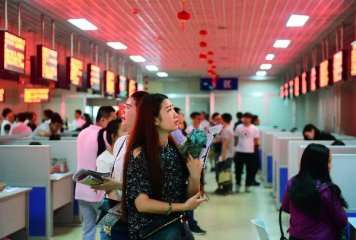
China's quarterly jobs report delivered a positive message about the world's second-largest economy Tuesday.
Official data showed that 3.34 million new jobs were created in the first quarter and the unemployment rate fell to 3.97 percent. The number of new jobs was 160,000 higher than that in the same period last year, and the unemployment rate was down 0.07 percentage points from a year earlier and 0.05 percentage points lower compared with the previous quarter.
"China's job market posted a strong start this year and remained stable in the first quarter," said Lu Aihong, spokesperson of the Ministry of Human Resources and Social Security, at a press conference.
Economists said the lower jobless rate suggested a healthier picture for the Chinese economy. From January to March, job vacancies rose 7.8 percent year on year while applicants increased 2.1 percent, according to data from the ministry.
"The need for workers is particularly pressing in the manufacturing sector," said Zhang Yizhen, vice minister of human resources and social security.
China's manufacturing sector in March stayed above the boom-bust mark for the eighth month in a row, reinforcing the message conveyed by increased industrial business profits, and shedding light on economic restructuring progress.
Meanwhile, employment picked up as more people came back for work after the Chinese New Year. According to a poll conducted by the ministry of 3,314 companies, the number of workers in these firms increased 4.6 percent to over 2 million, compared with the 1.93 million before the holiday.
"The string of employment data is in line with macroeconomic data released earlier," said Zhou Tianyong, professor at the Party School of the Communist Party of China Central Committee.
China's better-than-expected 6.9-percent economic growth in the first quarter has once again proved that the world's second-largest economy remains an important engine driving global growth. The reading, the fastest increase in 18 months, was above the full-year target of 6.5 percent and the 6.8-percent increase registered in the fourth quarter of 2016.
"If you look at the structure of the economy, the service industry is creating more jobs," said the ministry's spokesperson.
China's service sector expanded 7.7 percent year on year in the first quarter, up 0.1 percentage point compared to a year ago. It accounted for 56.5 percent of the country's GDP. While the employment data pointed to an optimistic economic outlook, challenges remain, experts said.
There are both quantitative and structural problems. On the one hand, more than 15 million people, including nearly 8 million college graduates, will enter the job market this year.
On the other hand, technical and skilled workers are badly needed.
The government has rolled out an array of pro-employment policies for college graduates, laid-off workers from glutted industries, and migrant workers, while the country's entrepreneurial wave has also helped job creation.
According to Chen Yu, vice director of the China Association of Employment Promotion, the key lies in the implementation of those policies. For example, banks sometimes still require a guarantor who works in a government agency for entrepreneurs applying for loans, making the process more complex than needed.
Authorities should step up policy support, including further tax cuts while allocating more subsidies to small and medium enterprises, which provide more than 75 percent of urban jobs, according to Zhou.
Additionally, China's social security system has improved and benefited more people, according to the spokesperson.
The population covered under social insurance schemes such as pensions and health insurance continued to expand while insurance fund revenue maintained stable growth, said Lu.
Tuesday's data also showed that gross revenue of social insurance funds increased 26.9 percent year on year to 1.53 trillion yuan (about 222.4 billion U.S. dollars) at the end of March, while gross expenditures totaled 1.18 trillion yuan, up 21.7 percent from a year ago.
China's social insurance funds include basic pension funds, basic medical insurance, unemployment insurance, work-related injury insurance and maternity insurance.
Pension funds have also been managed more effectively during the first quarter, with supervision in place to contain risks, Lu added.




















Latest comments